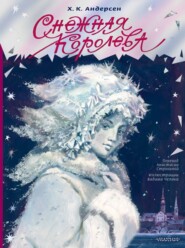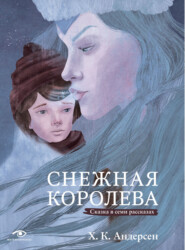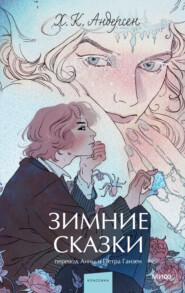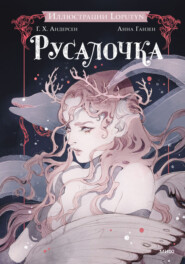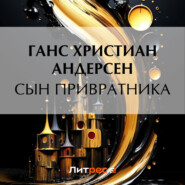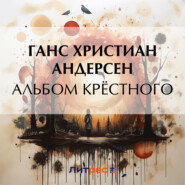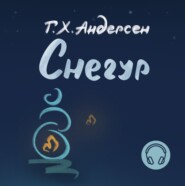По всем вопросам обращайтесь на: info@litportal.ru
(©) 2003-2024.
✖
What the Moon Saw: and Other Tales
Настройки чтения
Размер шрифта
Высота строк
Поля
But they had to make a choice. They went, and my father went with them. Soon afterwards we heard the sound of firing. The noise was renewed, and soldiers rushed into our hut, and took my mother, and myself, and my sister Anastasia prisoners. They declared that the robbers had been entertained by us, and that my father had acted as the robbers' guide, and therefore we must go with them. Presently I saw the corpses of the robbers brought in; I saw my father's corpse too. I cried and cried till I fell asleep. When I awoke, we were in prison, but the room was not worse than ours in our own house. They gave me onions to eat, and musty wine poured from a tarry cask, but we had no better fare at home.
How long we were kept prisoners I do not know; but many days and nights went by. When we were set free it was the time of the holy Easter feast. I carried Anastasia on my back, for my mother was ill, and could only move slowly, and it was a long way till we came down to the sea, to the Gulf of Lepanto. We went into a church that gleamed with pictures painted on a golden ground. They were pictures of angels, and very beautiful; but it seemed to me that our little Anastasia was just as beautiful. In the middle of the floor stood a coffin filled with roses. "The Lord Christ is pictured there in the form of a beautiful rose," said my mother; and the priest announced, "Christ is risen!" All the people kissed each other: each one had a burning taper in his hand, and I received one myself, and so did little Anastasia. The bagpipes sounded, men danced hand in hand from the church, and outside the women were roasting the Easter lamb. We were invited to partake, and I sat by the fire; a boy, older than myself, put his arms round my neck, kissed me, and said, "Christ is risen!" and thus it was that for the first time I met Aphtanides.
My mother could make fishermen's nets, for which there was a good demand here in the bay, and we lived a long time by the side of the sea, the beautiful sea, that tasted like tears, and in its colours reminded me of the song of the stag that wept – for sometimes its waters were red, and sometimes green or blue.
Aphtanides knew how to manage our boat, and I often sat in it, with my little Anastasia, while it glided on through the water, swift as a bird flying through the air. Then, when the sun sank down, the mountains were tinted with a deeper and deeper blue, one range seemed to rise behind the other, and behind them all stood Parnassus with its snow-crowned summit. The mountain-top gleamed in the evening rays like glowing iron, and it seemed as though the light came from within it; for long after the sun had set, the mountain still shone through the clear blue air. The white water birds touched the surface of the sea with their wings, and all here was as calm and quiet as among the black rocks at Delphi. I lay on my back in the boat, Anastasia leaned against me, and the stars above us shone brighter than the lamps in our church. They were the same stars, and they stood exactly in the same positions above me, as when I had sat in front of our hut at Delphi; and at last I almost fancied I was there. Suddenly there was a splash in the water, and the boat rocked violently. I cried out in horror, for Anastasia had fallen into the water: but in a moment Aphtanides had sprung in after her, and was holding her up to me! We dried her clothes as well as we could, remaining on the water till they were dry; for no one was to know what a fright we had had for our little adopted sister, in whose life Aphtanides now had a part.
The summer came. The sun burned so hot that the leaves turned yellow on the trees. I thought of our cool mountains, and of the fresh water they contained; my mother, too, longed for them; and one evening we wandered home. What peace, what silence! We walked on through the thick thyme, still fragrant though the sun had scorched its leaves. Not a single herdsman did we meet, not one solitary hut did we pass. Everything was quiet and deserted; but a shooting star announced that in heaven there was yet life. I know not if the clear blue air gleamed with light of its own, or if the radiance came from the stars; but we could see the outlines of the mountains quite plainly. My mother lighted a fire, roasted some roots she had brought with her, and I and my little sister slept among the thyme, without fear of the ugly Smidraki,[4 - According to the Greek superstition, this is a monster generated from the unopened entrails of slaughtered sheep, which are thrown away in the fields.] from whose throat fire spurts forth, or of the wolf and jackal; for my mother sat beside us, and I considered her presence protection enough for us.
We reached our old home; but the hut was a heap of ruins, and a new one had to be built. A few women lent my mother their aid, and in a few days walls were raised, and covered with a new roof of olive branches. My mother made many bottle cases of bark and skins; I kept the little flock of the priests,[5 - A peasant who can read often becomes a priest; he is then called "very holy Sir," and the lower orders kiss the ground on which he has stepped.] and Anastasia and the little tortoises were my playmates.
Once we had a visit from our beloved Aphtanides, who said he had greatly longed to see us, and who stayed with us two whole happy days.
A month afterwards he came again, and told us that he was going in a ship to Corfu and Patras, but must bid us good-bye first; and he had brought a large fish for our mother. He had a great deal to tell, not only of the fishermen yonder in the Gulf of Lepanto, but also of kings and heroes, who had once possessed Greece, just as the Turks possess it now.
I have seen a bud on a rose-bush gradually unfold in days and weeks, till it became a rose, and hung there in its beauty, before I was aware how large and beautiful and red it had become; and the same thing I now saw in Anastasia. She was now a beautiful grown girl, and I had become a stout stripling. The wolf-skins that covered my mother's and Anastasia's bed, I had myself taken from wolves that had fallen beneath my shots.
Years had gone by, when one evening Aphtanides came in, slender as a reed, strong and brown. He kissed us all, and had much to tell of the fortifications of Malta, of the great ocean, and of the marvellous sepulchres of Egypt. It sounded strange as a legend of the priests, and I looked up to him with a kind of veneration.
"How much you know!" I exclaimed; "what wonders you can tell of!"
"But you have told me the finest thing, after all," he replied. "You told me of a thing that has never been out of my thoughts – of the good old custom of the bond of friendship, a custom I should like to follow. Brother, let you and I go to church, as your father and Anastasia's went before us: your sister Anastasia is the most beautiful and most innocent of girls; she shall consecrate us! No people has such grand old customs as we Greeks."
Anastasia blushed like a young rose, and my mother kissed Aphtanides.
A couple of miles from our house there, where loose earth lies on the hill, and a few scattered trees give a shelter, stood the little church; a silver lamp hung in front of the altar.
I had put on my best clothes: the white fustanella fell in rich folds around my hips, the red jacket fitted tight and close, the tassel on my fez cap was silver, and in my girdle gleamed a knife and my pistols. Aphtanides was clad in the blue garb worn by Greek sailors; on his chest hung a silver plate with the figure of the Virgin Mary; his scarf was as costly as those worn by rich lords. Every one could see that we were about to go through a solemn ceremony. We stepped into the little simple church, where the evening sunlight, streaming through the door, gleamed on the burning lamp and the pictures on golden ground. We knelt down on the altar steps, and Anastasia came before us. A long white garment hung loose over her graceful form; on her white neck and bosom hung a chain, covered with old and new coins, forming a kind of collar. Her black hair was fastened in a knot, and confined by a head-dress made of silver and gold coins that had been found in an old temple. No Greek girl had more beautiful ornaments than she. Her countenance glowed, and her eyes were like two stars.
We all three prayed silently; and then she said to us, "Will you be friends in life and in death?" "Yes," we replied. "Will you, whatever may happen, remember this – my brother is a part of myself. My secret is his, my happiness is his. Self-sacrifice, patience – everything in me belongs to him as to me?" And we again answered, "Yes."
Then she joined our hands and kissed us on the forehead, and we again prayed silently. Then the priest came through the door near the altar, and blessed us all three; and a song, sung by the other holy men, sounded from behind the altar screen, and the bond of eternal friendship was concluded. When we rose, I saw my mother standing by the church door weeping heartily.
How cheerful it was now, in our little hut, and by the springs of Delphi! On the evening before his departure, Aphtanides sat thoughtful with me on the declivity of a mountain; his arm was flung round my waist, and mine was round his neck: we spoke of the sorrows of Greece, and of the men whom the country could trust. Every thought of our souls lay clear before each of us, and I seized his hand.
"One thing thou must still know, one thing that till now has been a secret between myself and Heaven. My whole soul is filled with love! with a love stronger than the love I bear to my mother and to thee!"
"And whom do you love?" asked Aphtanides, and his face and neck grew red as fire.
"I love Anastasia," I replied – and his hand trembled in mine, and he became pale as a corpse. I saw it; I understood the cause; and I believe my hand trembled. I bent towards him, kissed his forehead, and whispered, "I have never spoken of it to her, and perhaps she does not love me. Brother, think of this: I have seen her daily; she has grown up beside me, and has become a part of my soul!"
"And she shall be thine!" he exclaimed, "thine! I may not deceive thee, nor will I do so. I also love her; but to-morrow I depart. In a year we shall see each other once more, and then you will be married, will you not? I have a little gold of my own: it shall be thine. Thou must, thou shalt take it."
And we wandered home silently across the mountains. It was late in the evening when we stood at my mother's door.
Anastasia held the lamp upwards as we entered; my mother was not there. She gazed at Aphtanides with a beautifully mournful gaze. "To-morrow you are going from us," she said: "I am very sorry for it."
"Sorry!" he repeated, and in his voice there seemed a trouble as great as the grief I myself felt. I could not speak, but he seized her hand and said, "Our brother yonder loves you, and he is dear to you, is he not? His very silence is a proof of his affection."
Anastasia trembled and burst into tears. Then I saw no one but her, thought of none but her, and threw my arms round her, and said, "I love thee!" She pressed her lips to mine, and flung her arms round my neck; but the lamp had fallen to the ground, and all was dark around us – dark as in the heart of poor Aphtanides.
Before daybreak he rose, kissed us all, said farewell, and went away. He had given all his money to my mother for us. Anastasia was my betrothed, and a few days afterwards she became my wife.
JACK THE DULLARD
AN OLD STORY TOLD ANEW
Far in the interior of the country lay an old baronial hall, and in it lived an old proprietor, who had two sons, which two young men thought themselves too clever by half. They wanted to go out and woo the king's daughter; for the maiden in question had publicly announced that she would choose for her husband that youth who could arrange his words best.
So these two geniuses prepared themselves a full week for the wooing – this was the longest time that could be granted them; but it was enough, for they had had much preparatory information, and everybody knows how useful that is. One of them knew the whole Latin dictionary by heart, and three whole years of the daily paper of the little town into the bargain; and so well, indeed, that he could repeat it all either backwards or forwards, just as he chose. The other was deeply read in the corporation laws, and knew by heart what every corporation ought to know; and accordingly he thought he could talk of affairs of state, and put his spoke in the wheel in the council. And he knew one thing more: he could embroider braces with roses and other flowers, and with arabesques, for he was a tasty, light-fingered fellow.
"I shall win the princess!" So cried both of them. Therefore their old papa gave to each a handsome horse. The youth who knew the dictionary and newspaper by heart had a black horse, and he who knew all about the corporation laws received a milk-white steed. Then they rubbed the corners of their mouths with fish-oil, so that they might become very smooth and glib. All the servants stood below in the courtyard, and looked on while they mounted their horses; and just by chance the third son came up. For the proprietor had really three sons, though nobody counted the third with his brothers, because he was not so learned as they, and indeed he was generally known as "Jack the Dullard."
"Hallo!" said Jack the Dullard, "where are you going? I declare you have put on your Sunday clothes!"
"We're going to the king's court, as suitors to the king's daughter. Don't you know the announcement that has been made all through the country?" And they told him all about it.
"My word! I'll be in it too!" cried Jack the Dullard; and his two brothers burst out laughing at him, and rode away.
"Father dear," said Jack, "I must have a horse too. I do feel so desperately inclined to marry! If she accepts me, she accepts me; and if she won't have me, I'll have her; but she shall be mine!"
"Don't talk nonsense," replied the old gentleman. "You shall have no horse from me. You don't know how to speak – you can't arrange your words. Your brothers are very different fellows from you."
"Well," quoth Jack the Dullard, "if I can't have a horse, I'll take the billy-goat, who belongs to me, and he can carry me very well!"
And so said, so done. He mounted the billy-goat, pressed his heels into its sides, and gallopped down the high street like a hurricane.
"Hei, houp! that was a ride! Here I come!" shouted Jack the Dullard, and he sang till his voice echoed far and wide.
But his brothers rode slowly on in advance of him. They spoke not a word, for they were thinking about all the fine extempore speeches they would have to bring out, and all these had to be cleverly prepared beforehand.
"Hallo!" shouted Jack the Dullard. "Here am I! Look what I have found on the high-road." And he showed them what it was, and it was a dead crow.
"Dullard!" exclaimed the brothers, "what are you going to do with that?"
"With the crow? why, I am going to give it to the princess."
"Yes, do so," said they; and they laughed, and rode on.
"Hallo, here I am again! Just see what I have found now: you don't find that on the high-road every day!"
And the brothers turned round to see what he could have found now.
"Dullard!" they cried, "that is only an old wooden shoe, and the upper part is missing into the bargain; are you going to give that also to the princess?"
"Most certainly I shall," replied Jack the Dullard; and again the brothers laughed and rode on, and thus they got far in advance of him; but —
"Hallo – hop rara!" and there was Jack the Dullard again. "It is getting better and better," he cried. "Hurrah! it is quite famous."
How long we were kept prisoners I do not know; but many days and nights went by. When we were set free it was the time of the holy Easter feast. I carried Anastasia on my back, for my mother was ill, and could only move slowly, and it was a long way till we came down to the sea, to the Gulf of Lepanto. We went into a church that gleamed with pictures painted on a golden ground. They were pictures of angels, and very beautiful; but it seemed to me that our little Anastasia was just as beautiful. In the middle of the floor stood a coffin filled with roses. "The Lord Christ is pictured there in the form of a beautiful rose," said my mother; and the priest announced, "Christ is risen!" All the people kissed each other: each one had a burning taper in his hand, and I received one myself, and so did little Anastasia. The bagpipes sounded, men danced hand in hand from the church, and outside the women were roasting the Easter lamb. We were invited to partake, and I sat by the fire; a boy, older than myself, put his arms round my neck, kissed me, and said, "Christ is risen!" and thus it was that for the first time I met Aphtanides.
My mother could make fishermen's nets, for which there was a good demand here in the bay, and we lived a long time by the side of the sea, the beautiful sea, that tasted like tears, and in its colours reminded me of the song of the stag that wept – for sometimes its waters were red, and sometimes green or blue.
Aphtanides knew how to manage our boat, and I often sat in it, with my little Anastasia, while it glided on through the water, swift as a bird flying through the air. Then, when the sun sank down, the mountains were tinted with a deeper and deeper blue, one range seemed to rise behind the other, and behind them all stood Parnassus with its snow-crowned summit. The mountain-top gleamed in the evening rays like glowing iron, and it seemed as though the light came from within it; for long after the sun had set, the mountain still shone through the clear blue air. The white water birds touched the surface of the sea with their wings, and all here was as calm and quiet as among the black rocks at Delphi. I lay on my back in the boat, Anastasia leaned against me, and the stars above us shone brighter than the lamps in our church. They were the same stars, and they stood exactly in the same positions above me, as when I had sat in front of our hut at Delphi; and at last I almost fancied I was there. Suddenly there was a splash in the water, and the boat rocked violently. I cried out in horror, for Anastasia had fallen into the water: but in a moment Aphtanides had sprung in after her, and was holding her up to me! We dried her clothes as well as we could, remaining on the water till they were dry; for no one was to know what a fright we had had for our little adopted sister, in whose life Aphtanides now had a part.
The summer came. The sun burned so hot that the leaves turned yellow on the trees. I thought of our cool mountains, and of the fresh water they contained; my mother, too, longed for them; and one evening we wandered home. What peace, what silence! We walked on through the thick thyme, still fragrant though the sun had scorched its leaves. Not a single herdsman did we meet, not one solitary hut did we pass. Everything was quiet and deserted; but a shooting star announced that in heaven there was yet life. I know not if the clear blue air gleamed with light of its own, or if the radiance came from the stars; but we could see the outlines of the mountains quite plainly. My mother lighted a fire, roasted some roots she had brought with her, and I and my little sister slept among the thyme, without fear of the ugly Smidraki,[4 - According to the Greek superstition, this is a monster generated from the unopened entrails of slaughtered sheep, which are thrown away in the fields.] from whose throat fire spurts forth, or of the wolf and jackal; for my mother sat beside us, and I considered her presence protection enough for us.
We reached our old home; but the hut was a heap of ruins, and a new one had to be built. A few women lent my mother their aid, and in a few days walls were raised, and covered with a new roof of olive branches. My mother made many bottle cases of bark and skins; I kept the little flock of the priests,[5 - A peasant who can read often becomes a priest; he is then called "very holy Sir," and the lower orders kiss the ground on which he has stepped.] and Anastasia and the little tortoises were my playmates.
Once we had a visit from our beloved Aphtanides, who said he had greatly longed to see us, and who stayed with us two whole happy days.
A month afterwards he came again, and told us that he was going in a ship to Corfu and Patras, but must bid us good-bye first; and he had brought a large fish for our mother. He had a great deal to tell, not only of the fishermen yonder in the Gulf of Lepanto, but also of kings and heroes, who had once possessed Greece, just as the Turks possess it now.
I have seen a bud on a rose-bush gradually unfold in days and weeks, till it became a rose, and hung there in its beauty, before I was aware how large and beautiful and red it had become; and the same thing I now saw in Anastasia. She was now a beautiful grown girl, and I had become a stout stripling. The wolf-skins that covered my mother's and Anastasia's bed, I had myself taken from wolves that had fallen beneath my shots.
Years had gone by, when one evening Aphtanides came in, slender as a reed, strong and brown. He kissed us all, and had much to tell of the fortifications of Malta, of the great ocean, and of the marvellous sepulchres of Egypt. It sounded strange as a legend of the priests, and I looked up to him with a kind of veneration.
"How much you know!" I exclaimed; "what wonders you can tell of!"
"But you have told me the finest thing, after all," he replied. "You told me of a thing that has never been out of my thoughts – of the good old custom of the bond of friendship, a custom I should like to follow. Brother, let you and I go to church, as your father and Anastasia's went before us: your sister Anastasia is the most beautiful and most innocent of girls; she shall consecrate us! No people has such grand old customs as we Greeks."
Anastasia blushed like a young rose, and my mother kissed Aphtanides.
A couple of miles from our house there, where loose earth lies on the hill, and a few scattered trees give a shelter, stood the little church; a silver lamp hung in front of the altar.
I had put on my best clothes: the white fustanella fell in rich folds around my hips, the red jacket fitted tight and close, the tassel on my fez cap was silver, and in my girdle gleamed a knife and my pistols. Aphtanides was clad in the blue garb worn by Greek sailors; on his chest hung a silver plate with the figure of the Virgin Mary; his scarf was as costly as those worn by rich lords. Every one could see that we were about to go through a solemn ceremony. We stepped into the little simple church, where the evening sunlight, streaming through the door, gleamed on the burning lamp and the pictures on golden ground. We knelt down on the altar steps, and Anastasia came before us. A long white garment hung loose over her graceful form; on her white neck and bosom hung a chain, covered with old and new coins, forming a kind of collar. Her black hair was fastened in a knot, and confined by a head-dress made of silver and gold coins that had been found in an old temple. No Greek girl had more beautiful ornaments than she. Her countenance glowed, and her eyes were like two stars.
We all three prayed silently; and then she said to us, "Will you be friends in life and in death?" "Yes," we replied. "Will you, whatever may happen, remember this – my brother is a part of myself. My secret is his, my happiness is his. Self-sacrifice, patience – everything in me belongs to him as to me?" And we again answered, "Yes."
Then she joined our hands and kissed us on the forehead, and we again prayed silently. Then the priest came through the door near the altar, and blessed us all three; and a song, sung by the other holy men, sounded from behind the altar screen, and the bond of eternal friendship was concluded. When we rose, I saw my mother standing by the church door weeping heartily.
How cheerful it was now, in our little hut, and by the springs of Delphi! On the evening before his departure, Aphtanides sat thoughtful with me on the declivity of a mountain; his arm was flung round my waist, and mine was round his neck: we spoke of the sorrows of Greece, and of the men whom the country could trust. Every thought of our souls lay clear before each of us, and I seized his hand.
"One thing thou must still know, one thing that till now has been a secret between myself and Heaven. My whole soul is filled with love! with a love stronger than the love I bear to my mother and to thee!"
"And whom do you love?" asked Aphtanides, and his face and neck grew red as fire.
"I love Anastasia," I replied – and his hand trembled in mine, and he became pale as a corpse. I saw it; I understood the cause; and I believe my hand trembled. I bent towards him, kissed his forehead, and whispered, "I have never spoken of it to her, and perhaps she does not love me. Brother, think of this: I have seen her daily; she has grown up beside me, and has become a part of my soul!"
"And she shall be thine!" he exclaimed, "thine! I may not deceive thee, nor will I do so. I also love her; but to-morrow I depart. In a year we shall see each other once more, and then you will be married, will you not? I have a little gold of my own: it shall be thine. Thou must, thou shalt take it."
And we wandered home silently across the mountains. It was late in the evening when we stood at my mother's door.
Anastasia held the lamp upwards as we entered; my mother was not there. She gazed at Aphtanides with a beautifully mournful gaze. "To-morrow you are going from us," she said: "I am very sorry for it."
"Sorry!" he repeated, and in his voice there seemed a trouble as great as the grief I myself felt. I could not speak, but he seized her hand and said, "Our brother yonder loves you, and he is dear to you, is he not? His very silence is a proof of his affection."
Anastasia trembled and burst into tears. Then I saw no one but her, thought of none but her, and threw my arms round her, and said, "I love thee!" She pressed her lips to mine, and flung her arms round my neck; but the lamp had fallen to the ground, and all was dark around us – dark as in the heart of poor Aphtanides.
Before daybreak he rose, kissed us all, said farewell, and went away. He had given all his money to my mother for us. Anastasia was my betrothed, and a few days afterwards she became my wife.
JACK THE DULLARD
AN OLD STORY TOLD ANEW
Far in the interior of the country lay an old baronial hall, and in it lived an old proprietor, who had two sons, which two young men thought themselves too clever by half. They wanted to go out and woo the king's daughter; for the maiden in question had publicly announced that she would choose for her husband that youth who could arrange his words best.
So these two geniuses prepared themselves a full week for the wooing – this was the longest time that could be granted them; but it was enough, for they had had much preparatory information, and everybody knows how useful that is. One of them knew the whole Latin dictionary by heart, and three whole years of the daily paper of the little town into the bargain; and so well, indeed, that he could repeat it all either backwards or forwards, just as he chose. The other was deeply read in the corporation laws, and knew by heart what every corporation ought to know; and accordingly he thought he could talk of affairs of state, and put his spoke in the wheel in the council. And he knew one thing more: he could embroider braces with roses and other flowers, and with arabesques, for he was a tasty, light-fingered fellow.
"I shall win the princess!" So cried both of them. Therefore their old papa gave to each a handsome horse. The youth who knew the dictionary and newspaper by heart had a black horse, and he who knew all about the corporation laws received a milk-white steed. Then they rubbed the corners of their mouths with fish-oil, so that they might become very smooth and glib. All the servants stood below in the courtyard, and looked on while they mounted their horses; and just by chance the third son came up. For the proprietor had really three sons, though nobody counted the third with his brothers, because he was not so learned as they, and indeed he was generally known as "Jack the Dullard."
"Hallo!" said Jack the Dullard, "where are you going? I declare you have put on your Sunday clothes!"
"We're going to the king's court, as suitors to the king's daughter. Don't you know the announcement that has been made all through the country?" And they told him all about it.
"My word! I'll be in it too!" cried Jack the Dullard; and his two brothers burst out laughing at him, and rode away.
"Father dear," said Jack, "I must have a horse too. I do feel so desperately inclined to marry! If she accepts me, she accepts me; and if she won't have me, I'll have her; but she shall be mine!"
"Don't talk nonsense," replied the old gentleman. "You shall have no horse from me. You don't know how to speak – you can't arrange your words. Your brothers are very different fellows from you."
"Well," quoth Jack the Dullard, "if I can't have a horse, I'll take the billy-goat, who belongs to me, and he can carry me very well!"
And so said, so done. He mounted the billy-goat, pressed his heels into its sides, and gallopped down the high street like a hurricane.
"Hei, houp! that was a ride! Here I come!" shouted Jack the Dullard, and he sang till his voice echoed far and wide.
But his brothers rode slowly on in advance of him. They spoke not a word, for they were thinking about all the fine extempore speeches they would have to bring out, and all these had to be cleverly prepared beforehand.
"Hallo!" shouted Jack the Dullard. "Here am I! Look what I have found on the high-road." And he showed them what it was, and it was a dead crow.
"Dullard!" exclaimed the brothers, "what are you going to do with that?"
"With the crow? why, I am going to give it to the princess."
"Yes, do so," said they; and they laughed, and rode on.
"Hallo, here I am again! Just see what I have found now: you don't find that on the high-road every day!"
And the brothers turned round to see what he could have found now.
"Dullard!" they cried, "that is only an old wooden shoe, and the upper part is missing into the bargain; are you going to give that also to the princess?"
"Most certainly I shall," replied Jack the Dullard; and again the brothers laughed and rode on, and thus they got far in advance of him; but —
"Hallo – hop rara!" and there was Jack the Dullard again. "It is getting better and better," he cried. "Hurrah! it is quite famous."






